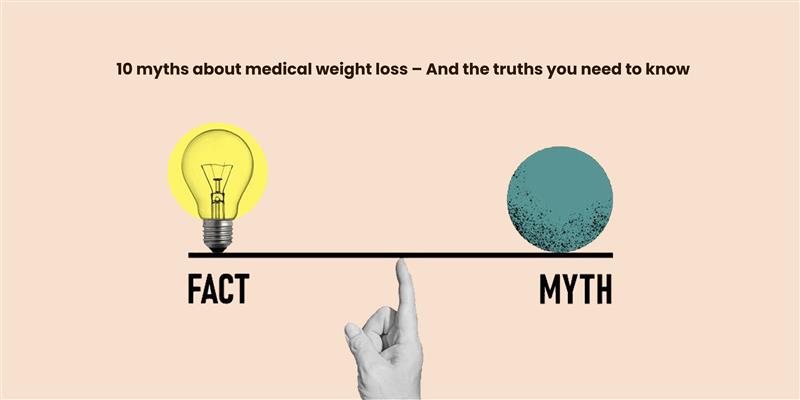
5 Nov 2024
10 myths about medical weight loss – And the truths you need to know
Medical weight loss has become a go-to option for those seeking expert guidance on their weight loss journey. But with its popularity, a lot of misconceptions have emerged, causing confusion and hesitation. Here, we’re setting the record straight by debunking 10 common myths about medical weight loss and revealing the truths that can help you make an informed decision.

Myth 1 - Medical weight loss is only for people with obesity
Truth - Medical weight loss is tailored to suit various needs, not just for individuals with obesity. People who are overweight or even those with certain health conditions related to weight, such as diabetes or high blood pressure, can also benefit from a medically supervised program. Medical weight loss is about improving health at every weight level.
Myth 2 - It’s just another diet program
Truth - Unlike fad diets, medical weight loss takes a science-backed approach. It combines nutrition, exercise, behavior modification and sometimes medication, all overseen by medical professionals. The goal is to create sustainable lifestyle changes rather than just quick weight loss.
Myth 3 - Medical weight loss is all about prescription medication
Truth - Medication is only a component of medical weight loss when necessary. Programs are personalized and may include diet plans, exercise routines and behavioral therapy. Medication is prescribed only when it aligns with your health needs and goals and is monitored closely by healthcare providers.
Myth 4 - It’s a quick fix for weight loss
Truth - Medical weight loss is not an instant solution. It focuses on gradual, sustainable weight loss, which has been proven more effective for long-term success. You can expect safe, steady results that align with your body’s natural pace, which ultimately reduces the chances of regaining the weight.
Myth 5 - Medical weight loss is too expensive
Truth - While costs vary, many medical weight loss programs are comparable to, or even more cost-effective than, other wellness and fitness programs. Additionally, some insurance providers may cover parts of the program if weight-related health issues are involved. When considering the impact on overall health, the investment can be a valuable step toward a healthier future.
Myth 6 - Only diet and exercise matter in medical weight loss
Truth - Diet and exercise are essential, but they are only part of the picture. Medical weight loss programs often delve into metabolic health, hormone balance, and psychological factors. These programs recognize that weight management is complex and needs a comprehensive approach that includes all aspects of health.
Myth 7 - It’s not safe
Truth - Medical weight loss is conducted under the guidance of healthcare professionals who monitor your progress to ensure safety and efficacy. Health screenings, lab tests, and regular check-ins are standard components of these programs, making medical weight loss one of the safest ways to lose weight under professional care.
Myth 8 - You can’t maintain weight loss long-term
Truth - Medical weight loss programs focus on lifestyle changes rather than temporary fixes, teaching skills and strategies that make long-term weight management possible. With regular follow-ups and support, individuals are empowered to maintain results through informed choices and sustainable habits.
Myth 9 - It’s only about physical changes
Truth - Medical weight loss doesn’t just impact your physical health; it also has profound effects on mental and emotional well-being. Many participants report increased confidence, improved mood, reduced anxiety and better overall mental health. By addressing emotional eating and self-perception, these programs create a holistic impact.
Myth 10 - You’ll lose motivation without constant supervision
Truth - Medical weight loss programs are designed to foster independence, so you don’t become dependent on constant supervision. Regular check-ins are part of the process, but you’ll also learn skills and techniques that make it easier to stay motivated on your own. Many programs provide resources and support networks to help you stay on track long after reaching your goals.

Conclusion
Medical weight loss is more than a weight-loss trend; it’s a science-backed, holistic approach to achieving and maintaining a healthy lifestyle. By breaking down these common myths, we hope to shed light on the true benefits and empowering aspects of medical weight loss. If you’re ready to take control of your health with accurate information and professional support, a medical weight loss program could be the solution you’ve been searching for.
Share: